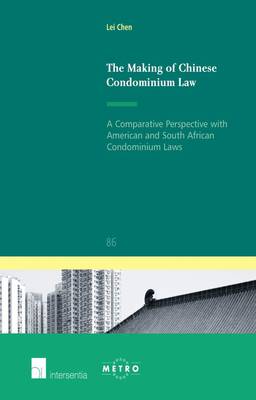
- Retrait gratuit dans votre magasin Club
- 7.000.000 titres dans notre catalogue
- Payer en toute sécurité
- Toujours un magasin près de chez vous
- Retrait gratuit dans votre magasin Club
- 7.000.0000 titres dans notre catalogue
- Payer en toute sécurité
- Toujours un magasin près de chez vous
The Making of Chinese Condominium Law
A Comparative Perspective with American and South African Condominium Laws Volume 86
Lei ChenDescription
China is still in the shadows, for it has no special condominium statute in spite of a fast-growing real estate market and the increasing popularity of condominiums. Even though apartments are the dominant form of housing in China, they are still largely poorly regulated. While in the 1990s condominium ownership was increasingly important due to the privatization of former public housing, obtaining a private title to an apartment usually proceeded without a proper legislative and institutional framework and therefore created many difficulties. The result has been more heat than light, with surprisingly little serious academic treatment of condominium ownership.
This book is a new exploration in Chinese condominium law. It addresses the legal deficiency of condominium law and seeks to map out an academically rigorous approach to understanding and formalizing it with a critical comparative analysis. The Uniform Common Interest Ownership Act of the United States of America and the Sectional Titles Act of South Africa are the chosen comparative entities for future Chinese condominium legislation. This comparative study will help to establish a uniform condominium statute in line with Chinese national characteristics and compatible with the pace of the country's economic development. Since it is clear that the new Chinese Property Law of 2007 will give a boost to further legislation on condominium law, one can safely predict that a special statute on the condominium will soon be on the Chinese legislative agenda. So this book providing a legislative framework based on a comparative study is almost certain to be useful. About this book'The publication of this work will certainly serve as a precious guide for the future of the codification of the Chinese Condominium law. However, the value of this study is not just limited to the aforementioned role. Moreover, this is also an instrumental guide about methodology, which could serve as a model for the future of comparative works.'
Bei Li in China-EU Law Journal (2011) 125.
Spécifications
Parties prenantes
- Auteur(s) :
- Editeur:
Contenu
- Nombre de pages :
- 214
- Langue:
- Anglais
- Collection :
Caractéristiques
- EAN:
- 9789400000889
- Date de parution :
- 26-05-10
- Format:
- Livre broché
- Format numérique:
- Trade paperback (VS)
- Dimensions :
- 172 mm x 236 mm
- Poids :
- 385 g

Les avis
Nous publions uniquement les avis qui respectent les conditions requises. Consultez nos conditions pour les avis.






